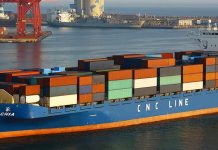
An annual report referring to incident data for the past year shows that the risk of goods being stolen due to the crisis in the supply chain has increased.
“Constant vigilance is required in order to combat the growing risk divergence in theft trends,” said Mike Yarwood, managing director, Loss Prevention, TT Club.
The report’s data were collected from sources including law enforcement agencies, governments, and trade unions.
As in previous years, the report was compiled by an international transport and logistics insurance company, TT Club, and global supply chain intelligence provider, BSI.
Yarwood noted that “criminals are quick to adapt to prevailing conditions and have swiftly responded to the increased opportunities that supply chain congestion presents through the amount of cargo laying idle.”
He added, “the transport industry’s growing reliance on technology and a rapidly changing market for sourcing materials and components have opened up new avenues for criminals to take advantage of companies’ increased vulnerabilities.”

As shown in the chart above, the most stolen cargo last year contained food and beverages (14%), agricultural products (12%), electronics (10%) and construction materials (9%).
The materials used to produce the latter two, such as nitrogen, iron ore, lumber, steel and semiconductors, have all experienced sharp inflation since the global pandemic erupted due to shortages with a consequent increase in the value of the products produced.
The report also provides tips on how operators can protect their cargo in order to decrease the chances of theft.
Tony Pelli, BSI’s practice director for Security and Resilience, has created a checklist of precautionary action points.
“To mitigate risk there is a range of safeguards, including careful verification of trucking companies and other sub-contractors; insisting on the provision of details such as driver’s name, trailer number and appointed pick-up times and background screening of employees,” explains Pelli.
Thorsten Neumann, president & CEO of Transported Asset Protection Association (TAPA) in Europe, Middle East and Africa (EMEA), commented, “what we are seeing in EMEA is a heightened level of risk to virtually all types of goods moving in supply chains across our region. This comes from increasingly active and sophisticated organised crime groups which often regard supply chains as an easy and lucrative target”.
He went on to point out, “Sadly, too many companies wait to seek solutions until they become a victim of a cargo crime but, by then, they will have suffered a significant financial and reputational loss. The way forward is to recognise the risks which exist and to learn about the industry standards, training and intelligence solutions which are available today and which are already key to the supply chain resilience of leading manufacturers and freight transport and logistic providers.”
Neumann concluded, “All is not lost, but it is a time for action to manage these risks and prevent rising product losses.”





